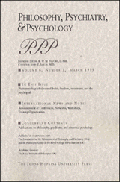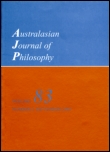
John Jamieson Carswell Smart was a British-Australian philosopher who was appointed as an Emeritus Professor by the Australian National University. He worked in the fields of metaphysics, philosophy of science, philosophy of mind, philosophy of religion, and political philosophy. He wrote several entries for the Stanford Encyclopedia of Philosophy.
In psychology a person who has a martyr complex, sometimes associated with the term "victim complex", desires the feeling of being a martyr for their own sake and seeks out suffering or persecution because it either feeds a physical need or a desire to avoid responsibility. In some cases, this results from the belief that the martyr has been singled out for persecution because of exceptional ability or integrity. Other martyr complexes involve willful suffering in the name of love or duty. This has been observed especially in poor families, as well as in codependent or abusive relationships. The desire for martyrdom is sometimes considered a form of masochism. Allan Berger, however, described it as one of several patterns of "pain/suffering seeking behavior", including asceticism and penance. Theologian Paul Johnson considers such beliefs a topic of concern for the mental health of clergy.

The Monist: An International Quarterly Journal of General Philosophical Inquiry is a quarterly peer-reviewed academic journal in the field of philosophy. It was established in October 1890 by American publisher Edward C. Hegeler.

Mind is a quarterly peer-reviewed academic journal published by Oxford University Press on behalf of the Mind Association. Having previously published exclusively philosophy in the analytic tradition, it now "aims to take quality to be the sole criterion of publication, with no area of philosophy, no style of philosophy, and no school of philosophy excluded." Its institutional home is shared between the University of Oxford and University College London. It is considered an important resource for studying philosophy.
Sir Francis Anderson was a Scottish-born Australian philosopher and educator.

Philosophy, Psychiatry, & Psychology is an academic journal founded in 1993 and the official publication of the Association for the Advancement of Philosophy and Psychiatry (AAPP) which fosters close associations with the American Psychiatric Association. The journal focuses on the overlap of philosophy, psychiatry, and abnormal psychology. It aims to make clinical material accessible to philosophers while advancing philosophical inquiry into the area of psychology. It includes book reviews, original works, and a variety of special columns.
In philosophy, four-dimensionalism is the ontological position that an object's persistence through time is like its extension through space. Thus, an object that exists in time has temporal parts in the various subregions of the total region of time it occupies, just like an object that exists in a region of space has at least one part in every subregion of that space.
Kenneth "Harry" Oldmeadow is an Australian academic, author, editor and educator whose works focus on religion, tradition, traditionalist writers and philosophy.
The Australasian Association of Philosophy (AAP) is the peak body for philosophy in Australasia. The chief purpose of the AAP is to promote philosophy in Australia, New Zealand, and Singapore. Among the means that it follows to achieve this end, the AAP runs an annual conference, publishes two journals, awards various prizes, sponsors postgraduate and undergraduate philosophical activities, maintains affiliations with numerous other organisations that aim to promote philosophy and philosophical activity, and promotes philosophy in schools, cafes, pubs, and everywhere else that philosophy may be found.

The American Catholic Philosophical Quarterly is a peer-reviewed academic journal sponsored by the American Catholic Philosophical Association. It was founded in 1927 as The New Scholasticism and adopted its current title in 1990. The journal publishes articles and book reviews covering the entire range and history of Western philosophical thought. Contributions on non-Western philosophy are also published, especially if they shed light upon issues in the Western tradition. The journal is not committed to any particular school of philosophy and contributions variously employ analytical, phenomenological, Thomistic, historical, and other methods. Nevertheless, it typically prefers contributions on topics or thinkers that are of special interest to Catholic thought. Thus, almost every issue usually carries at least one article on Thomas Aquinas. Pieces on medieval thought are well represented as well, as are essays in the philosophy of religion and philosophical theology.
The American Philosophical Quarterly (APQ) is a peer-reviewed academic journal covering philosophy. It was established in 1964 by Nicholas Rescher and is published quarterly by University of Illinois Press under license with North American Philosophical Publications.
Brian Ellis is an Australian philosopher. He is an Emeritus Professor in the philosophy department at La Trobe University in Victoria, Australia, and Professional Fellow in philosophy at the University of Melbourne. He was the Editor of the Australasian Journal of Philosophy for twelve years. He is one of the major proponents of the New Essentialist school of philosophy of science. In later years he has brought his understanding of scientific realism to the Social Sciences, developing the philosophy of Social Humanism. He was appointed a Fellow of the Australian Academy of the Humanities in 1972.
John Weckert is an Australian philosopher who has been an influential figure in, and substantial contributor to the field of information and computer ethics. He has published many books and journal articles outlining his research in this field.

Gualtiero Piccinini is an Italian–American philosopher known for his work on the nature of mind and computation as well as on how to integrate psychology and neuroscience. He is Curators' Distinguished Professor in the Philosophy Department and Associate Director of the Center for Neurodynamics at the University of Missouri, St. Louis.

Religious Studies is a peer-reviewed academic journal published by Cambridge University Press. It addresses problems of the philosophy of religion in the context of a variety of religious traditions. Issues were published approximately biannually from the journal's founding in 1965 until 1969, and have been quarterly since 1970.

James Giles is a Canadian philosopher and psychologist. He has written about the philosophy of perception, personal identity and the self, mindfulness, Buddhist and Taoist philosophy, and has published theories of the evolution of human hairlessness, the nature of sexual desire, sexual attraction, and gender. His wide range of academic interests and often controversial views have earned him the title of an "interdisciplinary maverick."
Australian philosophy refers to the philosophical tradition of the people of Australia and of its citizens abroad. Academic philosophy has been mostly pursued in universities. It has been broadly in the tradition of Anglo-American analytic philosophy, but has also had representatives of a diverse range of other schools, such as idealism, Catholic neo-scholasticism, Marxism, and continental, feminist and Asian philosophy.
Peter Charles Menzies was an Australian philosopher and past president of the Australasian Association of Philosophy, who held teaching positions at Macquarie University, University of Sydney, and Australian National University. He specialized in metaphysics, especially the philosophy of causation. He became a fellow of the Australian Academy of the Humanities in 2007.
Graham Nerlich was an Australian philosopher. He was an Emeritus Professor of Philosophy at the University of Adelaide, and his expertise was in the areas of philosophy; existence of God; meaning of life; mind and body; ethics; and philosophy of science.
Stephen Cade Hetherington is an Australian analytic philosopher specialising in epistemology and, to a lesser extent, metaphysics. He is an emeritus professor in the School of Humanities and Languages at the University of New South Wales, a prolific author, and served as editor-in-chief of the Australasian Journal of Philosophy from December 2013 to March 2022.









